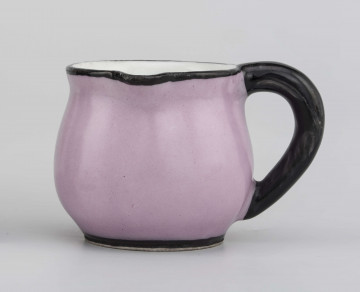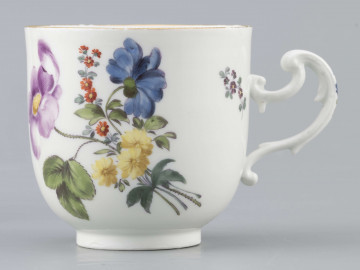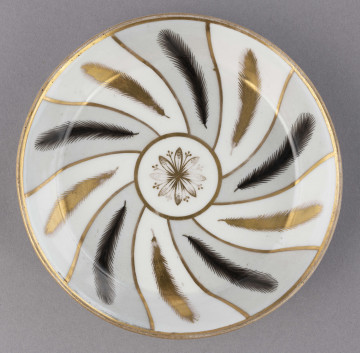
Creamer jug
1825 — 1835
National Museum in Lublin
Part of the collection: European porcelain
Porcelain production in Berlin began in 1753 at the initiative of the merchant William Casper Wegely. A few years later Ernst Gotzkowsky founded a factory, where he employed experienced Wegely's workers who were introduced to the arcana of production. In 1763 Frederick II took over the factory and as a sign of royal affiliation he gave it his signature in the form of a sceptre. Since then, the manufactory has operated under the name Kӧnigliche Porzellan-Manufaktur Berlin (KPM) until today. Its production was dominated by table sets, which enjoyed a well-deserved reputation for the high level of painted designs. Trained painters were employed for this work, whose names are known from the archives - one of them created a park scene on the cup. This decorative and at the same time harmonious composition was created by a skilled painter. In a very small space, he was able to convey the depth of perspective of the vast landscape, the small details of the foreground, the details of the clothing of the figures. The author of the miniature is Heinrich Wilhelm Hinze (1800-1862), who studied the difficult art of painting on porcelain from the age of fourteen in a school run by the Berlin factory. In 1820 he left the factory and went on a study trip to Mecklenburg and Rügen. During the trip he was commissioned by the Grand Duke of Mecklenburg to paint numerous landscapes, city views, and architectural monuments. Afterwards he made similar trips to the Alps, Rhineland, Austria, Bohemia and Silesia. In 1830, he returned to Berlin and used the experience he gained to paint landscapes in a porcelain factory. At the same time, between 1824 and 1858, he regularly participated in exhibitions of the Berlin Academy and worked as a painter and draughtsman for the later Emperor Frederick III.
Barbara Czajkowska
Author / creator
Dimensions
cały obiekt: height: 8 cm, width: 11,5 cm
Object type
dish
Technique
overglaze paints
Material
porcelain
Creation time / dating
Creation / finding place
Owner
The National Museum in Lublin
Identification number
Location / status

1825 — 1835
National Museum in Lublin

1735 — 1750
National Museum in Lublin

1807
National Museum in Lublin
DISCOVER this TOPIC
Museum of King Jan III's Palace at Wilanów
DISCOVER this PATH
Educational path